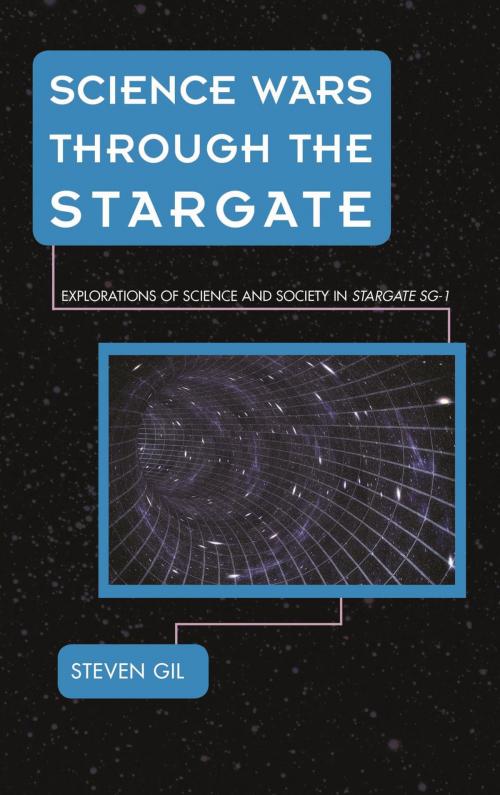Science Wars through the Stargate
Explorations of Science and Society in Stargate SG-1
Nonfiction, Entertainment, Performing Arts, Television, History & Criticism| Author: | Steven Gil | ISBN: | 9781442256200 |
| Publisher: | Rowman & Littlefield Publishers | Publication: | October 8, 2015 |
| Imprint: | Rowman & Littlefield Publishers | Language: | English |
| Author: | Steven Gil |
| ISBN: | 9781442256200 |
| Publisher: | Rowman & Littlefield Publishers |
| Publication: | October 8, 2015 |
| Imprint: | Rowman & Littlefield Publishers |
| Language: | English |
The story of an elite team of scientists and soldiers who travel to other worlds through an alien-built portal, Stargate SG-1 gave its viewers a weekly dose of spectacle and high adventure. Over its ten-season run (1997-2007), the series explored the interactions of the scientific and military cultures represented by its characters, as well as the place of science in society. The initial airing of Stargate SG-1 coincided with the “Science Wars,” a highly public clash among scholars and public intellectuals over the nature and value of scientific knowledge. Critics of science argued that it was merely one form of knowledge among many, subject to biases and blind spots imposed by the culture in which it was created. Defenders of science—mostly scientists themselves—contended that it possessed a unique ability to uncover universal truths, and thus was uniquely valuable to society.
In Science Wars through the Stargate: Explorations of Science and Society in Stargate SG-1, Steven Gil offers the first in-depth analysis of the series and places it in the context of contemporary debates about the nature of scientific thought. Gil contends that representations of science within SG-1 can be more fully understood through the prism of the Science Wars. Scientific ideas put forth in SG-1 demonstrate how such complex intellectual exchanges and debates have a place in popular culture and can be further understood through these fictional articulations. Although SG-1 serves as the principal case study, the analysis also casts light on the role and position of science in science fiction television more generally.
The long-form narrative of Stargate SG-1 enabled it to engage, in sophisticated ways, with many of the questions at issue in the Science Wars. As the author illustrates, the show presented a complex, sophisticated portrait of science and scientists at a time when the scientific enterprise was under intense public scrutiny. Science Wars through the Stargate will be of interest to science fiction scholars and fans of the series, but also to those interested in the public’s evolving understanding of science and its role in society.
The story of an elite team of scientists and soldiers who travel to other worlds through an alien-built portal, Stargate SG-1 gave its viewers a weekly dose of spectacle and high adventure. Over its ten-season run (1997-2007), the series explored the interactions of the scientific and military cultures represented by its characters, as well as the place of science in society. The initial airing of Stargate SG-1 coincided with the “Science Wars,” a highly public clash among scholars and public intellectuals over the nature and value of scientific knowledge. Critics of science argued that it was merely one form of knowledge among many, subject to biases and blind spots imposed by the culture in which it was created. Defenders of science—mostly scientists themselves—contended that it possessed a unique ability to uncover universal truths, and thus was uniquely valuable to society.
In Science Wars through the Stargate: Explorations of Science and Society in Stargate SG-1, Steven Gil offers the first in-depth analysis of the series and places it in the context of contemporary debates about the nature of scientific thought. Gil contends that representations of science within SG-1 can be more fully understood through the prism of the Science Wars. Scientific ideas put forth in SG-1 demonstrate how such complex intellectual exchanges and debates have a place in popular culture and can be further understood through these fictional articulations. Although SG-1 serves as the principal case study, the analysis also casts light on the role and position of science in science fiction television more generally.
The long-form narrative of Stargate SG-1 enabled it to engage, in sophisticated ways, with many of the questions at issue in the Science Wars. As the author illustrates, the show presented a complex, sophisticated portrait of science and scientists at a time when the scientific enterprise was under intense public scrutiny. Science Wars through the Stargate will be of interest to science fiction scholars and fans of the series, but also to those interested in the public’s evolving understanding of science and its role in society.















